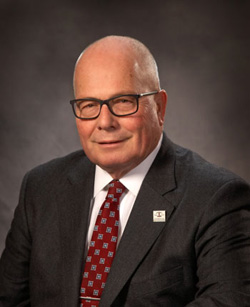August 2018 • Volume 106 • Number 8 • Page 8
Thank you for viewing this Illinois Bar Journal article. Please join the ISBA to access all of our IBJ articles and archives.
President's Page
A Crucial Partnership: ISBA & LAP
ISBA President James F. McCluskey dedicates his column to the Lawyers' Assistance Program.

This month's President's Page is dedicated to the Illinois Lawyers' Assistance Program ("LAP"). Co-founded in 1980 by the Illinois State Bar Association to help lawyers recover from alcohol abuse, LAP is now an independent nonprofit organization that assists lawyers, judges, and law students struggling with stress, burnout, depression, anxiety, grief, career transition, substance abuse and addiction, aging and cognitive concerns, and overall well-being.
Based in Chicago, LAP also operates centers in Bloomington, Carbondale, Metro East, Park Ridge, and Rock Island and is planning to soon open a satellite office in either Kane or DuPage County.
The growth and expansion of LAP's services and geographic locations are in direct response to the ever-increasing needs of our legal profession. Recent national studies confirm that lawyers, judges, and law students suffer from mental-health and addiction issues at levels much higher than the general population does. These studies also have shown that our law students and young attorneys are more prone to substance abuse and poor mental health than their older colleagues. A 2016 study published in the Journal of Addiction Medicine concluded that "youth is a predictor of impairment" (see https://bit.ly/2KjCBFG). In other words, the younger the attorney, the more likely she or he will suffer from substance abuse and declining mental health.
Despite the increasing number of distressed younger attorneys, senior attorneys also are at risk. Many do not have succession or retirement plans and may leave the profession because of financial, cognitive, and stress-related problems. Such departures threaten the well-being of the profession. At present, LAP does not have the resources to assist lawyers who are struggling to prepare for retirement.
In the coming year, the ISBA and LAP will create new educational programs that will address these escalating needs. This year, we expect to sponsor a series of conversations about mental health and substance abuse intended to educate our members and the public.
According to the 2016 Journal of Addiction Medicine study, only 37 percent of lawyers struggling with mental-health issues received assistance. Lawyers struggling with substance abuse have gone nearly untreated, with statistics showing only seven percent receiving assistance. These statistics are shocking and need to change if lawyers are to make progress in professional and overall wellness.
Lawyers are not alone: There are those within the profession who want to help. And the dire demands for consultation and treatment beyond our profession mean many other resources also are available. If we do not help our fellow lawyers, much is jeopardized beyond their own livelihoods and families. Clients and the public who rely on the legal expertise and commitment of attorneys also may be harmed.
Thus, in promoting emotional and physical well-being, I suggest that you spread the word about LAP. LAP's services are free and confidential. These services are available 24 hours a day, seven days a week.
If you are an attorney and are struggling with any of these issues, please seek out LAP for assistance. Please join me in supporting LAP and its mission to assist, protect, and educate the legal community regarding substance abuse and mental health. You can even contribute to LAP as a volunteer and become part of the solution. These changes are needed and must take place to preserve our profession-and to turn the tide toward health and wellness for lawyers here in Illinois.
Joining forces, we can effect change.
For more information or to contact LAP:
www.illinoislap.org, gethelp@illinoislap.org
1-800-LAP-1233.


Member Comments (2)
Law enforcement’s new power to raid attorney’s offices and homes to confiscate and leak their clients’ files to journalists suggests avoiding LAP and going to anonymous 12 Step programs.
Commingling client with attorney information subject to confiscation from lawyers’ offices and homes can injure clients more than commingling their money.